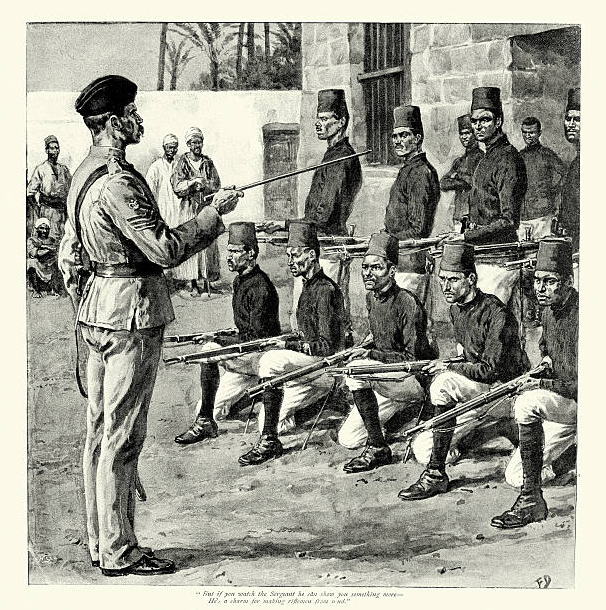Editor’s note: The following is extracted from The Five Nations, by Rudyard Kipling (published 1903).
Said England unto Pharaoh, ‘I must make a man of you,
That will stand upon his feet and play the game;
That will Maxim his oppressor as a Christian ought to do,’
And she sent old Pharaoh Sergeant Whatisname.
It was not a Duke nor Earl, nor yet a Viscount—
It was not a big brass General that came;
But a man in khaki kit who could handle men a bit,
With his bedding labelled Sergeant Whatisname.
Said England unto Pharaoh, ‘Though at present singing small,
You shall hum a proper tune before it ends,’
And she introduced old Pharaoh to the Sergeant once for all,
And left ’em in the desert making friends.
It was not a Crystal Palace nor Cathedral;
It was not a public-house of common fame;
But a piece of red-hot sand, with a palm on either hand,
And a little hut for Sergeant Whatisname.
Said England unto Pharaoh, ‘You’ve had miracles before,
When Aaron struck your rivers into blood;
But if you watch the Sergeant he can show you something more,
He’s a charm for making riflemen from mud.’
It was neither Hindustani, French, nor Coptics;
It was odds and ends and leavings of the same,
Translated by a stick (which is really half the trick),
And Pharaoh harked to Sergeant Whatisname.
(There were years that no one talked of; there were times of horrid doubt—
There was faith and hope and whacking and despair—
While the Sergeant gave the Cautions and he combed old Pharaoh out,
And England didn’t seem to know nor care.
That is England’s awful way o’ doing business—
She would serve her God or Gordon just the same—
For she thinks her Empire still is the Strand and Holborn Hill,
And she didn’t think of Sergeant Whatisname.)
Said England to the Sergeant, ‘You can let my people go!’
(England used ’em cheap and nasty from the start),
And they entered ’em in battle on a most astonished foe—
But the Sergeant he had hardened Pharaoh’s heart
That was broke, along of all the plagues of Egypt,
Three thousand years before the Sergeant came—
And he mended it again in a little more than ten,
So Pharaoh fought like Sergeant Whatisname!
It was wicked bad campaigning (cheap and nasty from the first),
There was heat and dust and coolie-work and sun,
There were vipers, flies, and sandstorms, there was cholera and thirst,
But Pharaoh done the best he ever done.
Down the desert, down the railway, down the river,
Like Israelites from bondage so he came,
’Tween the clouds o’ dust and fire to the land of his desire,
And his Moses, it was Sergeant Whatisname!
We are eating dirt in handfuls for to save our daily bread,
Which we have to buy from those that hate us most,
And we must not raise the money where the Sergeant raised the dead,
And it’s wrong and bad and dangerous to boast.
But he did it on the cheap and on the quiet,
And he’s not allowed to forward any claim—
Though he drilled a black man white, though he made a mummy fight,
He will still continue Sergeant Whatisname—
Private, Corporal, Colour-Sergeant, and Instructor—
But the everlasting miracle’s the same!









